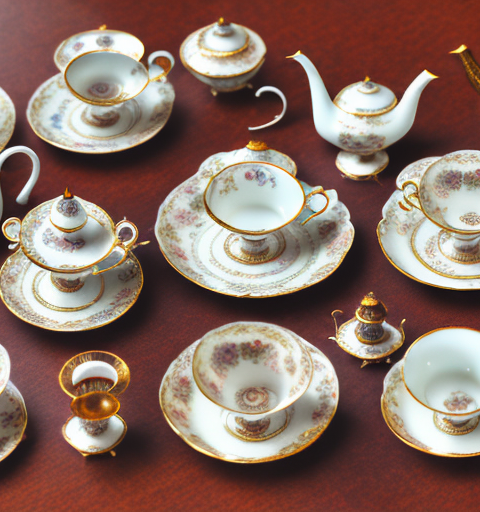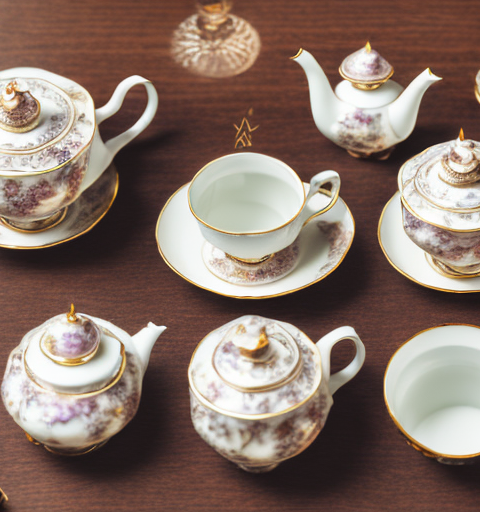Tea stains on the ceramic handle of a teapot can be unsightly and difficult to remove, especially if the handle has a unique shape. However, with the right materials and techniques, you can tackle this issue and restore your teapot handle to its former glory. In this article, we will explore the importance of a clean teapot handle, identify the common culprits behind tea stains on ceramic handles, and discuss the challenges of cleaning a teapot handle with a unique shape. We will also provide a step-by-step guide to removing tea stains from a unique-shaped ceramic teapot handle, discuss natural remedies and commercial cleaning products, and offer tips for preventing tea stains in the future. Additionally, we will explore alternative cleaning methods, troubleshoot common issues encountered during tea stain removal, delve into the significance of regular maintenance for ceramic teapot handles, and seek expert advice for tackling stubborn tea stains. Finally, we will examine the science behind tea stains on ceramic surfaces and explore DIY hacks for removing tea stains from challenging ceramic handle shapes.
Understanding the importance of a clean teapot handle
A clean teapot handle is not only visually appealing but also essential for maintaining hygiene and preventing cross-contamination. Over time, tea stains can accumulate on the handle, making it appear dirty and neglected. However, it’s important to note that tea stains are not simply a cosmetic issue; they can harbor bacteria and affect the taste of your tea. Regular cleaning of your teapot handle is crucial to ensure the optimum enjoyment of your tea and the longevity of your teapot.
In addition to the hygiene and aesthetic reasons, a clean teapot handle also plays a role in preserving the quality of your tea. When the handle is dirty, it can transfer unwanted flavors and odors to your tea, compromising its taste. By keeping the handle clean, you can ensure that the true flavors of your tea are not altered or contaminated.
Furthermore, a clean teapot handle can contribute to the overall experience of enjoying a cup of tea. When the handle is clean and free from stains, it enhances the visual appeal of the teapot and adds to the pleasure of sipping tea. It creates a sense of cleanliness and attention to detail, making the tea-drinking experience more enjoyable and satisfying.
Identifying the common culprits behind tea stains on ceramic handles
Tea stains on ceramic handles can be caused by various factors. One common culprit is tannins, which are naturally present in tea. When tea is repeatedly poured into the teapot, these tannins can accumulate and leave behind stains on the handle. Additionally, if the teapot handle is not properly cleaned after each use, residue can build up and contribute to the formation of tea stains. Other factors, such as the temperature of the water used, the quality of the tea leaves, and the length of time the tea is steeped, can also impact the formation of tea stains on ceramic handles.
Another factor that can contribute to the formation of tea stains on ceramic handles is the type of ceramic used. Some ceramics are more porous than others, which means they are more likely to absorb the tannins and other compounds present in tea. This can result in deeper and more stubborn stains that are harder to remove. It is important to consider the type of ceramic when choosing teapots or other ceramic vessels to minimize the risk of tea stains on the handles.
Exploring the challenges of cleaning a teapot handle with a unique shape
Cleaning a teapot handle with a unique shape can present additional challenges. The irregular curves and crevices of the handle can make it difficult to reach all areas during the cleaning process. Traditional cleaning methods, such as wiping or soaking, may not be effective in removing tea stains from intricate handle shapes. Therefore, it’s important to consider alternative cleaning techniques and tools that can help tackle these hard-to-reach areas and ensure a thorough cleaning.
One alternative cleaning technique that can be effective for cleaning teapot handles with unique shapes is using a small brush or toothbrush. The bristles of the brush can easily reach into the crevices and corners of the handle, allowing for a more thorough cleaning. Additionally, using a gentle cleaning solution specifically designed for removing tea stains can help break down and remove stubborn residue. It’s important to be gentle when scrubbing the handle to avoid damaging the surface. Regular maintenance and cleaning of the teapot handle can help prevent buildup and make future cleaning easier.
Gathering the necessary materials for removing tea stains from ceramic handles
Before embarking on the task of removing tea stains from a ceramic teapot handle, it’s important to gather the necessary materials. You will need a soft cloth or sponge, mild dish soap, white vinegar, baking soda, a toothbrush, and warm water. These materials will help you tackle the tea stains effectively and minimize any potential damage to the ceramic surface of your teapot handle.
Additionally, it may be helpful to have a small bowl or container to mix the cleaning solution in. This will make it easier to apply the solution to the tea stains on the ceramic handle. It’s also a good idea to have a towel or paper towels nearby to dry the handle after cleaning. Remember to always follow the manufacturer’s instructions for cleaning and care of your specific ceramic teapot handle to ensure the best results.
Step-by-step guide to removing tea stains from a unique-shaped ceramic teapot handle
Now that you have the necessary materials ready, let’s dive into a step-by-step guide for removing tea stains from a unique-shaped ceramic teapot handle:
- Start by dampening the soft cloth or sponge with warm water.
- Add a small amount of mild dish soap to the damp cloth or sponge and gently clean the entire surface of the teapot handle, focusing on the areas with tea stains.
- Rinse the handle with warm water to remove any soap residue.
- If the tea stains persist, create a paste using equal parts baking soda and warm water.
- Gently apply the baking soda paste to the stained areas of the teapot handle and use a toothbrush to scrub in a circular motion.
- Rinse the handle thoroughly with warm water to remove any residue.
- If the tea stains are particularly stubborn, you can try soaking the teapot handle in a mixture of white vinegar and warm water for a few hours.
- After soaking, rinse the handle with warm water and dry it with a clean cloth.
Following these steps should help remove tea stains from your unique-shaped ceramic teapot handle. However, if the stains persist, you can continue exploring the alternative methods and tips discussed in this article.
It’s important to note that different types of tea stains may require different cleaning methods. For example, if you’re dealing with stubborn black tea stains, you can try using lemon juice instead of dish soap. The acidity of the lemon juice can help break down the stains and make them easier to remove.
If you’re concerned about using harsh chemicals on your ceramic teapot handle, you can also try using a natural cleaning solution. One option is to mix equal parts white vinegar and water, and use this mixture to clean the stained areas. Vinegar is a natural disinfectant and can help remove stains without causing any damage to the ceramic surface.
Trying out natural remedies for removing tea stains from ceramic handles
If you prefer natural remedies, there are several options you can try to remove tea stains from ceramic handles. Lemon juice, for example, can be effective in breaking down the stains. Squeeze fresh lemon juice onto a soft cloth or sponge and gently rub it onto the stained areas. Alternatively, you can create a mixture of lemon juice and baking soda to form a paste, apply it to the stains, and scrub with a toothbrush. Rinse thoroughly with warm water after cleaning. White vinegar can also be used in a similar manner to remove tea stains. Remember to always test these natural remedies on a small, inconspicuous area of the teapot handle before applying them to the entire surface.
In addition to lemon juice and white vinegar, another natural remedy that can be effective in removing tea stains from ceramic handles is hydrogen peroxide. Hydrogen peroxide is a mild bleaching agent that can help to lighten and remove stubborn stains. To use hydrogen peroxide, dampen a cloth or sponge with the solution and gently rub it onto the stained areas. Allow it to sit for a few minutes before rinsing thoroughly with warm water. It is important to note that hydrogen peroxide may have a bleaching effect on certain materials, so it is recommended to test it on a small, inconspicuous area before using it on the entire handle.
Examining the effectiveness of commercial cleaning products for tea stain removal
If natural remedies don’t yield the desired results, you can explore commercial cleaning products specifically designed for tea stain removal. There are various cleaners available in the market that are formulated to break down tea stains on ceramic surfaces. Read the instructions carefully and follow them to ensure safe and effective use. Always test a small amount of the product on an inconspicuous area of the handle before applying it to the entire surface. Commercial cleaning products can be a convenient and effective solution for stubborn tea stains on unique-shaped teapot handles.
Tips for preventing tea stains on ceramic teapot handles in the future
Prevention is key when it comes to minimizing tea stains on ceramic teapot handles. Follow these tips to keep your teapot handle clean and stain-free:
- After each use, rinse the teapot handle with warm water to remove any residual tea.
- Regularly clean the teapot handle with mild dish soap and warm water to prevent the buildup of tea stains.
- Consider using a teapot handle cover or a silicone grip to minimize direct contact between the handle and the tea.
- Avoid using abrasive sponges or scouring pads, as they can scratch the ceramic surface and make it more susceptible to staining.
- Store your teapot in a dry and well-ventilated area to prevent moisture buildup, which can contribute to the formation of tea stains.
Exploring alternative methods for cleaning unique-shaped ceramic teapot handles
If the traditional cleaning methods mentioned earlier don’t work for your unique-shaped ceramic teapot handle, don’t be discouraged. There are alternative methods you can explore. For example, steam cleaning can be an effective way to remove tea stains from hard-to-reach areas. Using a handheld steam cleaner or a steam cleaning attachment, direct the steam onto the stained areas of the handle and gently wipe with a soft cloth. The heat and pressure from the steam can help dissolve the tea stains and lift them from the surface. Again, it’s important to test the steam cleaner on a small area before using it on the entire handle to avoid any potential damage.
Troubleshooting common issues encountered while removing tea stains from ceramic handles
While removing tea stains from ceramic handles, you may encounter certain issues that require troubleshooting. For example, if the stains are particularly stubborn and refuse to come off, try repeating the cleaning process or applying a stronger cleaning solution. If the handle is made of delicate ceramic or has a fragile coating, avoid using abrasive cleaning tools that can damage the surface. Instead, opt for gentle cleaning methods, such as using a soft cloth or sponge. Consulting a professional cleaner or the manufacturer of your teapot handle can also provide valuable guidance and expertise to troubleshoot any challenges encountered during the cleaning process.
Understanding the importance of regular maintenance for ceramic teapot handles
Regular maintenance is crucial to ensure the longevity and cleanliness of ceramic teapot handles. By incorporating a simple cleaning routine into your tea preparation ritual, you can prevent tea stains from accumulating and ensure that your teapot handle remains in pristine condition. Remember to clean the handle thoroughly after each use and periodically perform a deeper cleaning to remove any stubborn stains. By giving your teapot handle the attention it deserves, you can enjoy a clean and hygienic tea-drinking experience.
Expert advice on tackling stubborn tea stains on unique-shaped teapot handles
When it comes to tackling stubborn tea stains on unique-shaped teapot handles, expert advice can be invaluable. Professional cleaners and teapot manufacturers have extensive knowledge and experience in dealing with tea stains and can provide specific recommendations based on the material and shape of your teapot handle. Don’t hesitate to reach out to them for guidance and solutions tailored to your unique teapot handle.
The science behind why tea stains occur on ceramic surfaces and how to combat them
Tea stains occur on ceramic surfaces primarily due to the presence of tannins in the tea. Tannins are natural compounds found in tea leaves and are responsible for the astringent taste. When tea is repeatedly poured into a teapot, the tannins can adhere to the ceramic surface, resulting in stains. To combat tea stains, it’s important to break down the tannins and remove them from the ceramic handle. This can be achieved through a combination of cleaning techniques, such as using mild dish soap, baking soda, or natural remedies like lemon juice and white vinegar. The specific cleaning method may vary depending on the unique shape and material of the teapot handle, so it’s important to experiment and find the most effective approach for your situation.
Exploring DIY hacks for removing tea stains from challenging ceramic handle shapes
If you enjoy do-it-yourself projects, there are several DIY hacks you can try for removing tea stains from challenging ceramic handle shapes. For example, creating a paste with hydrogen peroxide and baking soda can help break down the stains. Apply the paste to the affected areas, let it sit for a few minutes, and then scrub with a toothbrush. Another DIY solution is to soak the teapot handle in a mixture of warm water and denture cleaning tablets. The effervescent action of the tablets can help loosen the tea stains. Remember to always test these DIY hacks on a small, inconspicuous area before applying them to the entire handle to ensure compatibility with the ceramic surface.
In conclusion, removing tea stains from the ceramic handle of a teapot with a unique shape may seem like a daunting task, but with the right materials, techniques, and perseverance, it can be accomplished. By understanding the importance of a clean teapot handle, identifying the common culprits behind tea stains, and exploring the challenges associated with unique-shaped teapot handles, you can approach the task with knowledge and confidence. Follow the step-by-step guide provided, experiment with natural remedies and commercial cleaning products, and implement preventative measures to keep tea stains at bay in the future. Should you encounter any difficulties, seek expert advice, troubleshoot common issues, and explore alternative cleaning methods. By taking care of your ceramic teapot handle, you can ensure its longevity and enjoy many more delightful cups of tea.






